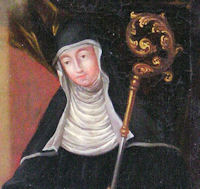Catholic Culture
Ordinary Time: February 25th
Monday of the Seventh Week of Ordinary Time
MASS READINGS
February 25, 2019 (Readings on USCCB website)
COLLECT PRAYER
Grant, we pray, almighty God, that, always pondering spiritual things, we may carry out in both word and deed that which is pleasing to you. Through our Lord Jesus Christ, your Son, who lives and reigns with you in the unity of the Holy Spirit, one God, for ever and ever.
show
Recipes (3)
show
Activities (2)
show
Prayers (1)
show
Library (1)
» Enjoy our Liturgical Seasons series of e-books!
Old Calendar: St. Walburga, abbess (Hist)
Historically today is the feast of St. Walburga, sister of Sts. Willibald and Winebald. She became a nun at Wimborne in Dorset under St. Tatta and followed St. Lioba to Germany at the invitation of St. Boniface. She died abbess of Hiedenheim, whence her relics were translated to Eichstatt.
St. Walburga
St. Walburga was born around 710. She is the daughter of St. Richard and the niece of St. Boniface. When St. Richard set out for a pilgrimage to the Holy Land with his sons, Ss. Willibald & Winibald, he entrusted 11 year old Walburga to the monastery school at Wimborne. She remained as a nun, spending a total of 26 years there.
When St. Boniface put out an appeal for nuns to help him in the evangelization of Germany, St. Walburga answered the call. On the way to Germany, there was a terrible storm at sea. Walburga knelt on the deck of the ship and prayed. The sea immediately became calm. Some sailors witnessed this and spread the word that she was a wonderworker, so she was received in Germany with great respect.
At first, she lived at Bischofsheim, under the rule of St. Lioba. Then she was made abbess at Heidenheim, near to where her brother, Winibald served as an abbot over a men's monastery. After his death, she ruled both monasteries. She worked many miracles in the course of her ministry. She wrote a biography of her brother, Winibald, and of Willibald's travels in Palestine, in Latin. She is regarded as the first woman author in both England and Germany.
On September 23, 776, she assisted Willibald in translating the uncorrupt relics of their brother, Winibald, to a new tomb in the church at Heidenheim. Shortly after this, she fell ill. Willibald cared for her until she died on February 25, 777, then placed her next to Winibald in the tomb.
After St. Willibald's death in 786, people gradually forgot St. Walburga and the church fell into disrepair. In 870, Bishop Oktar was having Heidenheim restored. Some workmen desecrated Walburga's grave. She appeared in a dream to the bishop, who then translated her relics to Eichstadt. In 893, St. Walburga's body was found to be immersed in a mysterious sweet-smelling liquid. It was found to work miraculous healings. The liquid, called St. Walburga's oil, has flowed from her body, ever since, except for a brief period when the church was put under the interdict after robbers shed the blood of a bell-ringer in the church. Portions of St. Walburga's relics have taken to several other cities and her oil to all parts of the world.
The Word Among Us
Meditation: Sirach 1:1-10
7th Week in Ordinary Time
Who can number these? . . . Who can explore these? (Sirach 1:2, 3)
Modern-day scientists can answer many of Sirach’s “unanswerable questions.” Sands of the seashore? Take the amount of grains of sand in a teaspoon and multiply it by the volume of all the beaches and deserts on earth: scientists estimate it’s over seven quintillion (that’s seven with eighteen zeroes after it). The depths of the abyss? Through unmanned submarines, scientists can descend three miles into the deep chasms of the ocean and study its mysteries.
But that knowledge is not the wisdom Sirach is talking about.
From now until Ash Wednesday, we will be reading from the Book of Sirach, a collection of sayings and moral teachings that is part of the wisdom literature in the Hebrew Bible. Today’s reading is a poetic introduction to the book, and it highlights this essential point: all wisdom comes from the Lord (Sirach 1:1). Wisdom helps us see the world as God does. Wisdom helps us know how to live in this world that God has created. Wisdom helps us understand who we are and how we should relate to the people in our lives. In short, wisdom—God’s wisdom—is available to guide every aspect of our lives.
Isn’t that good news? God doesn’t keep his wisdom to himself. He freely—lavishly—gives it to his friends. That includes you!
One of the most obvious ways God shares his wisdom is through his word. Sirach says, “The word of God on high is the fountain of wisdom” (1:5). St. Paul would agree—he urges Timothy to use the Scriptures to teach, correct, and train himself in all areas of righteous living (2 Timothy 3:16).
Today is a good day to take some time to seek God’s wisdom. Try sitting with the Scriptures for a bit, and allow them to sink into your mind and heart. Maybe use today’s readings. Or you could use a favorite psalm or a story from the Gospels. Whatever passage you choose, give yourself time to read prayerfully and to ponder what you read. Let the words open your heart to God’s heart. Let them open your eyes to the way God looks at things. Let them show you how to live.
God’s thoughts are indeed deeper than the abyss. So dive into his word, and discover all that he wants to show you.
“Father, thank you for teaching me the way of wisdom.”
